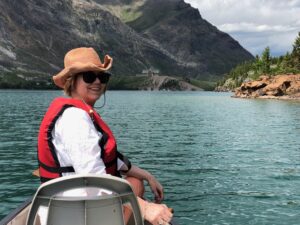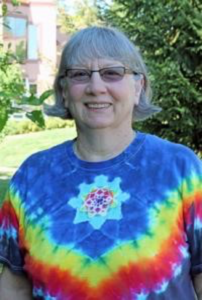6 Reflections on Leadership and Mentorship in ABE
It seems we are in a time of great transition as boomers retire, gen x and millenials take the reins, and zoomers graduate and carve out their space in the workforce. We have also faced events and circumstances that add to these shifting sands in higher ed as we are affected by global pandemics, changing international enrollments, and a quickly changing market and political landscape. With all of this going on, it is more important than ever to support one another as educators so that we are able to serve students and preserve and advance ABE in higher education. Please read on for two stories of leadership and mentorship – both from experienced educators in the field of ABE.
By Kim Tamblyn
I was fortunate enough to be the youngest faculty member in my department for the first fifteen years or so of my current twenty-six-year teaching career. I have always enjoyed the company of individuals older than myself, so it was a comfortable and rewarding working environment.
 I loved being the youngest in my department. So many of my colleagues graciously mentored me throughout my career: Lee Emery, Mary Madden, Doug Knowles, Eric Villeneuve, Kim Moshenko, and Susie Safford. Their patience and support were a big part of my success. An experience that stands out was working with Susie Safford. Pre Covid and during Covid, I co-chaired the department with Susie who shared her 45 plus years of experience and wisdom with me. Through her mentorship, I learned how to navigate challenging situations, implement and practice process, support and advocate for faculty, and to fill out a wide variety of university forms and paperwork…an endless list, really. She encouraged me to “listen until your ears bleed”, to build strong processes into committees and to model collegial governance. Her goal was to create a healthy, sustainable department and I believe that we succeeded.
I loved being the youngest in my department. So many of my colleagues graciously mentored me throughout my career: Lee Emery, Mary Madden, Doug Knowles, Eric Villeneuve, Kim Moshenko, and Susie Safford. Their patience and support were a big part of my success. An experience that stands out was working with Susie Safford. Pre Covid and during Covid, I co-chaired the department with Susie who shared her 45 plus years of experience and wisdom with me. Through her mentorship, I learned how to navigate challenging situations, implement and practice process, support and advocate for faculty, and to fill out a wide variety of university forms and paperwork…an endless list, really. She encouraged me to “listen until your ears bleed”, to build strong processes into committees and to model collegial governance. Her goal was to create a healthy, sustainable department and I believe that we succeeded.
When I talked to other faculty and administrators about how lucky I was to work with Susie, a few colleagues pointed out that I played a part in making our relationship work. They noted that I was open to being mentored. I was choosing to absorb her knowledge. I hadn’t thought of this before, but just like any successful relationship, both individuals need to be open and generous.
I was very comfortable being the mentee and I could have happily gone on this way. About six years ago, though, as more and more people in our department retired, I suddenly found myself in the position of a “senior” faculty member. I moaned and groaned a bit about my change in status (getting older and all), but I realized that I needed to give back and take on a new role in the department as a mentor. It wasn’t a natural role for me, but I knew I had experience and knowledge to offer and that it was time for me to contribute in a different way.
The act of sharing expertise and knowledge is critical for smooth transitions. This was especially evident during Covid. Many highly experienced and valued employees took buyouts or retired which left a significant gap as people came back to the workplace. Years of institutional knowledge disappeared and there was little opportunity for succession planning and sharing of information. Key people throughout the university and community were suddenly gone along with their experience and expertise, and new employees did not have the same opportunity to be mentored. Covid highlighted the importance of being intentional about mentoring and succession planning.
Taking on a mentoring role is part of a normal cycle. If you’re not naturally inclined to be a mentor, then it can seem somewhat daunting; however, working outside of your comfort zone can be an opportunity for growth and renewal. A healthy society and workplace rely on the willingness of individuals to share, support and nurture each other and the openness of others to accept the passing of knowledge.
By Leonne Beebe
 The first time I heard about ABEABC was at my first provincial ABE Articulation meeting in 2001. Bev Krieger, (Kwantlen), started our meeting by inviting us all to attend the next ABEABC conference in Prince George in 2002. As this was my first ABEABC conference, Bev mentored me with my first presentation. Then, after attending Marina Niks’ same conference presentation on “Research in Practice” I was hooked. For the next five years, I was mentored by her as a member of the RiPAL BC (Research in Practice in Adult Literacy BC) provincial research project. Our RiPAL BC group presented twice at international literacy research conferences in England as well as at our ABEABC conferences. All this happened because Bev first invited me to an ABEABC conference and mentored me.
The first time I heard about ABEABC was at my first provincial ABE Articulation meeting in 2001. Bev Krieger, (Kwantlen), started our meeting by inviting us all to attend the next ABEABC conference in Prince George in 2002. As this was my first ABEABC conference, Bev mentored me with my first presentation. Then, after attending Marina Niks’ same conference presentation on “Research in Practice” I was hooked. For the next five years, I was mentored by her as a member of the RiPAL BC (Research in Practice in Adult Literacy BC) provincial research project. Our RiPAL BC group presented twice at international literacy research conferences in England as well as at our ABEABC conferences. All this happened because Bev first invited me to an ABEABC conference and mentored me.
At the Richmond 2003 conference, Rita Smilkstein presented brain-based learning and how it affects the learning process. She totally changed how I perceived my teaching. My research was now supported by my teaching philosophy and methodology. ABEABC brought research and practice together for me. Since then, each ABEABC conference has become the highlight of my teaching year.
Encouraged by ABEABC mentors Yvonne Chard, Andrea Eaton,( ESL, Delta School District) and Linda Ohashi,( Adult Ed, Burnaby School District), I boldly volunteered to be the Conference Chair for the Camosun College, Victoria, 2008 Conference where our Lt. Gov. Steven Point and his wife, Gwen, presented. Now reflecting on Yvonne’s years of mentoring me as conference chair, I have fond memories of months of chaos and confusion transformed into cohesive conferences where the most interesting people participated and presented. ABEABC conferences provide so many memories, especially when my students co-presented with me. Mentoring my student tutor, Lauren Lowe (now in our UFV Teacher Ed program), to co-present with me emphasized the possibility of expanding the vision of mentoring in ABEABC to students as well as colleagues.
Yvonne also mentored many other ABEABE members as they accepted new Board positions, presented at conferences, and had their articles published in our Groundwork trade magazine, One of Yvonne’s well-known mentees was/is Angi Loft who accepted the President position. I remember our present president, Izabela Mazure, presenting at her first conference. Now, she is an accomplished contributor to BC Campus’s Open Learning resources with two math books published.
Reflecting on my years with ABEABC, it has been a privilege and a pleasure being mentored and mentoring the new younger members as they presented at our conferences, published in Groundwork, and accepted Board positions. Viviana Chiorean, who started as my classroom tutor, presented, published, and accepted the Vice-President position. Michelle Vandepol, who was my UFV colleague, became the editor of Groundwork and Conference Chair before she became President. She, in turn, mentored UFV colleagues Mark Friesen, now Vice-President and Conference Co-chair, Shauna Svekla, now Treasurer, and Barnabe Assogba, our Fraser Valley Rep.
What impresses me the most about our ABEABC mentorship legacy is how such a small team of dedicated, passionate people continually present our yearly conferences and our Groundwork magazine, which are of such value to the people working in ABE/ ESL.
